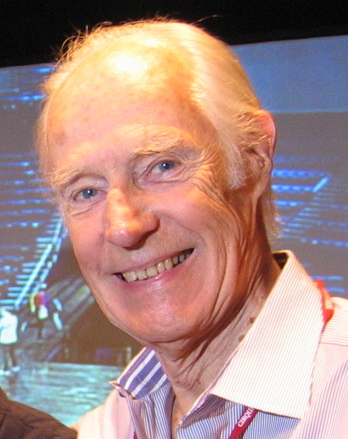Well, again working strictly to the film, where you had this lovely, lovely land of brightness and color. And everybody is smiling and happy and butterflies flitting around and it was that kind of image that, it was like a dream world, really.

"Sir George Henry Martin" Order of the British Empire/CBE is an English record producer, arranger, composer, conductor, audio engineer and musician. He is sometimes referred to as "the Fifth Beatle" in reference to his extensive involvement on each of the Beatles' original albums. He is considered one of the greatest record producers of all time, with 30 number one hit singles in the United Kingdom and 23 number one hits in the United States.
Influenced by a range of musical styles, encompassing Cole Porter and Johnny Dankworth, he attended the Guildhall School of Music and Drama from 1947 to 1950, studying piano and oboe. Following his graduation, he worked for the BBC's European classical music/classical music department, then joined EMI in 1950. Martin produced comedy and novelty records in the early 1950s, working with Peter Sellers and Spike Milligan, among others.
In a career spanning over six decades, Martin has worked in music, film, television and live performance. He has also held a number of senior executive roles at media companies and contributes to a wide range of charitable causes, including his work for the Prince's Trust and the Caribbean island of Montserrat.
In recognition of his services to the music industry and popular culture, he was made a Knight Bachelor in 1996.
If you enjoy these quotes, be sure to check out other famous producers! More George Martin on Wikipedia.I think that one of the nice things about the Yellow Submarine movie is that it seems to be perennial. People enjoy watching from each generation. And it was like the Beatles themselves. You know the Beatles seem to find new audience each time another generation comes along.
It sounds all very sort of technical, but in fact it was very much a kind of bootlace affair. I mean, in the Abbey Road in those days was a fairly primitive place by today's standards.
Well, I think, I certainly used backward music in Sea of Monsters. I can't remember in the Sea of Time. I would tend to do that all the time, you know? I tended to do all sorts of weird things. Just to get effects.
And the young people in the 1960's identified with it immediately, because, I guess the young people had been having years of repression really. They felt that the, you know, after the war everything was very austere, particularly in Europe.
But when Brian committed them to the picture and he said that they would provide new songs, they said, "Well, we're not going to write any decent songs, we'll give them all the rejects we didn't really want."
I mean there were tambourines, and a gong and that kind of thing. And all sorts of weird things, whistles and even a little cupboard with a door that opened and shut so you could get the noise of a door opening if you wanted to have someone coming in and out of a room. And it was really a junkyard more than anything else.
In Yellow Submarine, we used chains that were there and all sorts of bowls and things. And of course, we used bowls of water too. And bottles with straws, blowing them into the water, to get the effect of submarines surfacing, that kind of thing. It was nice to do because it, we were all being very inventive. And it was fun, it was like a party almost.
You'd use recorded effects and then they'd have to come off discs. So we tried to make our own, and we used to have all sorts of things. We used to have roller skates for making train noises over rails and I remember once trying to effect the noise of someone's head being chopped off. I used a cabbage for that, it was very effective.
Copyright © 2024 Electric Goat Media. All Rights Reserved.